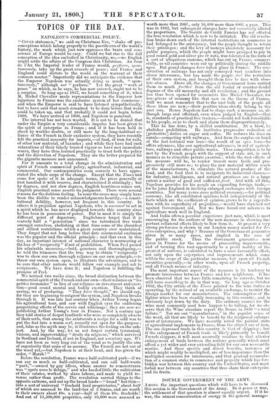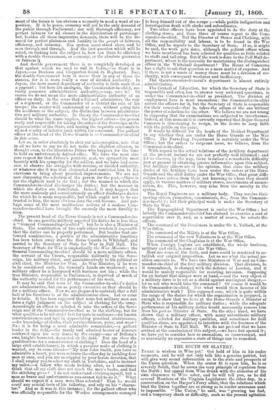DOUBLE GOVERNMENT OF THE ARMY.
AMONG the important questions which will have to be discussed this session is the Government of the Army. Be it peace or war, the settlement of that question is almost equally urgent. If it be war, the utmost concentration of energy in the general manage- ment of the forces is too obvious a necessity to need a word of ex- position. If it be peace, economy will not be the only demand of the public through Parliament; nor will thorough efficiency, nor perfect fairness for all classes in the distribution of patronage : but, besides all those imperative demands, there will be the de- mand for perfect plainness and lucidity in the proofs of fairness, efficiency, and economy. The system must stand clear, and be seen through and through. And the first question which will be asked, on looking into the subject is, how can there be efficiency with a double Government, or economy, or the absolute guarantee or fairness ?i And double government there is as completely developed as that against which we used to rail in India,—as there is in Japan,—as Denham and Clapperton found in Begharmi. Nay, the double Government here is worse than in any of those in- stances, for it is more really a case of divided authority. In Japan, the more sacred depositary of authority is little more than a pageant ; but here his analogue, the Commander-in-chief, ac- tually possesses administrative authority,—nay, uses it! Of course we do not mean the mere administrative authority of an officer on duty, in the sense that a Colonel administers the rule ■ of a regiment, or the Commander of a district the rule of his troops ; the reader will understand at once, without going into the accidence of the subject, the distinction between administra- tive and military authority. In theory the Commander-in-chief should be what the name implies, the highest officer—the person ready and responsible for taking the orders of the Sovereign as the representative of the State, and issuing the requisite commands to all and sundry of inferior rank within his command. The gallant officer at the head of the Horse Guards is no Commander-in-chief in this sense.
Let us, in order absolutely to shut out misconception' note that in all we have to say we do not. make the slightest allusion, in thought even to the illustrious Prince who happens for the time to hold an unfortunately ddiined office. We have the most sin- cere respect for that Prince's patriotic zeal, we sympathize most heartily with his sympathy for the soldier, and we have had occa- sion to observe his struggles with routine or divided authority, or whatever else it was that obstructed and restricted him in his exertions to bring about practical improvements. We are not now discussing the selection of the person for the post,—there is not the slightest need to do that ; nor the manner in which the Commander-in-chief discharges his duties ; but the manner in which the duties are distributed. Indeed, it may happen that the more zealously and conscientiously an officer discharges duties for which he is made responsible, but which ought not to be en- trusted to him, the more obvious does the evil become. And per- haps some of the most meritorious actions of a zealous Com- mander-in-chief have brought the anomaly the more forcibly to view.
The present head of the Horse Guards is not a Commander-in- chief. In one genuine military aspect of his duties he is less than a "General Commanding-in-chief"; but he is also a Minister of State. The combination of two such offices renders it impossible that the duties can be properly performed. But besides that un- toward combination, a portion of the administrative functions has been taken away from the Horse Guards in Whitehall, and carried to the Secretary of State for War in Pall Mall. The Secretary of State for War is emphatically the War Minister: the General Commanding-in-chief should be a mere military officer, the servant of the Crown, responsible failitarily to the Sove- reign, his military chief, and administratively to his political or civil chief, the Minister for War. As War Minister, if he were to be considered such, the General's hands are weakened; as a military officer he is hampered with business not his ; while the true Minister, responsible to Parliament, is deprived of much of the authority needed for the performance of his work.
It may be said that none of the Commander-in-chief's duties are adminstrative, but are as purely executive as they should be for a military officer. Now we are prepared to maintain that a full half of his functions is of the administrative class. Let us come to details. It has been supposed that none but military men can form a right judgment on the subject of clothing for the army. Accordingly an officer is selected to take the orders of the Sove- reign anct of the Commander-in-chief as to the clothing, but for what qualities is he selected ? Is it for taste in uniforms—for known constructiveness and tact in appreciating practical contrivances, —for knowledge of cloths, their serviceableness, price, and wear ? No; it is for being a most admirable commander,—a gallant leader in the field,—the manly and admired bearer of honours conferred upon his very frame by the enemy—one of Bellona's own knights banneret, decorated on the field. But are these the qualifications for a commissioner of clothing ? Does the head of a large civil establishment, in which a peculiar make of clothing is wanted, say to some friend—" My dear John Smith, you have so admirable a heart, you were so brave the other day in tackling four men at once, and you are so crippled by your heroic devotion, that I shall employ you to select my cloth in Yorkshire, and to instruct my tailor,—a fellow who needs looking after, as I sometimes think that all my cloth does not reach the men's backs, and find the stitching gives ? I do not understand stitching myself, but a man so brave and unfortunate as you cannot fail to do it." What should we expect if a man were thus selected? That he would avoid any crucial tests of his tailoring, and rely on his "charac- ter." And so it was in this instance ; for the gallant officer who was officially responsible for the Weedon arrangements managed
to keep himself out of the scrape ;—while public indignation and investigation dealt with clerks and subordinates. Two other officers have been appointed to do the duty at the clothing stores, and these three of course report to the Com- mander-in-chief. But the Director of Stores and Clothing, with all the responsibility and labour, is to be found in the War Office, and he reports to the Secretary of State. If so, it might be said, the work gets done, although the gallant officer whom we have mentioned has been selected for qualities so little related to stuffs and tailoring. But if the work is done in the Pall Mall de- partment, where is the necessity for maintaining the distinguished officer in the Whitehall department ? The House of Commons has a right to ask that question as a mere matter of expense. And if there is not a waste of money there must be a division of au- thority, with consequent weakness and inefficiency. The Quartermaster-General's department is almost entirely administrative.
The Council of Education, for which the Secretary of State is responsible and often has to answer very awkward questions, is under the Commander-in-chief as president. The division of employment here is most anomalous : the Commander-in-chief selects the officers for it, but the Secretary of State is responsible for their removal—that is, takes the odium of the one without the power of selection for the other. We believe we are not wrong in supposing that the examinations are subjected to interference. Indeed, at this moment it is currently reported that Major-General Cameron is threatening to resign, in the desire to keep faith with the public on the point.
It would be difficult for the heads of the Medical Department to say whether they are under the Horse Guards or the War Office. The Purveying Department is certainly under the War Office ; but the orders to surgeons issue, we believe, from the Commander-in-chief.
With regard to the actual relations of the Artillery department at the present instant we are not perfectly well informed ; and let us observe, by the way, there is rather a remarkable difficulty just at present in obtaining precise information upon this subject. But Artillery officers are of the opinion, that since the military duties of the Artillery have been under the orders of the Horse Guards and the civil duties under the War Office that great diffi- culties have arisen from their not knowing to whom they should apply, in various matters of military stores, assortments of ammu- nition, &c. This, however, may arise from the novelty in the system.
The Royal Engineers are a military body. They receive their moving orders, promotion' commissions &c., from the Comman- der-in-chief ; but their principal work is under the Secretary of State for War.
The Topographical Department is under the War Office ; but latterly the Commander-in-chief has claimed to exercise a sort of supervision over it, and, as a matter of course, he selects the officers.
The command of the Pensioners is under Sir A. Tulloch, at the War Office.
The command of the Militia is at the War Office.
The command of the new Volunteers is at the War Office.
The command of the Chaplains is at the War Office.
When Foreign Legions are established, the whole business, military and civil, is done at the Wp -Office.
Here are some of the facts, and More could be mustered to es- tablish our original proposition. Let us see what the actual po- sition amounts to. We have two Ministers of War and no Com- mander-in-chief of the first military division. That division, be it remembered, is charged with the defence of London, and it would be mainly responsible for resisting. invasion. Supposing for an instant that danger were at hand,—and the very object of a military force is to act as a shield against contingent danger —
let us ask who would take the command ? Of course it would be
Commander-in-chief. But what would then become of his administrative work ? This supposed case, which is quite within the range of the duties for which the organization is prepared, is enough to show that we have at the Horse Guards a Minister of State who is responsible for military duties ; while the adequate performance of his military duties would necessarily remove him from his post as Minister of State. On the other hand, we have shown that a military officer, with many subordinate military officers, selected for military qualities, and sometimes for field qualities alone, are appointed to interfere with the business of the Minister of State in Pall Mall. We do not pretend that we have arrived at the conclusion of this subject,—we have but opened it ; we have yet to consider how so anomalous, so inconvenient, and so necessarily an expensive a state of things can be remedied.



























 Previous page
Previous page